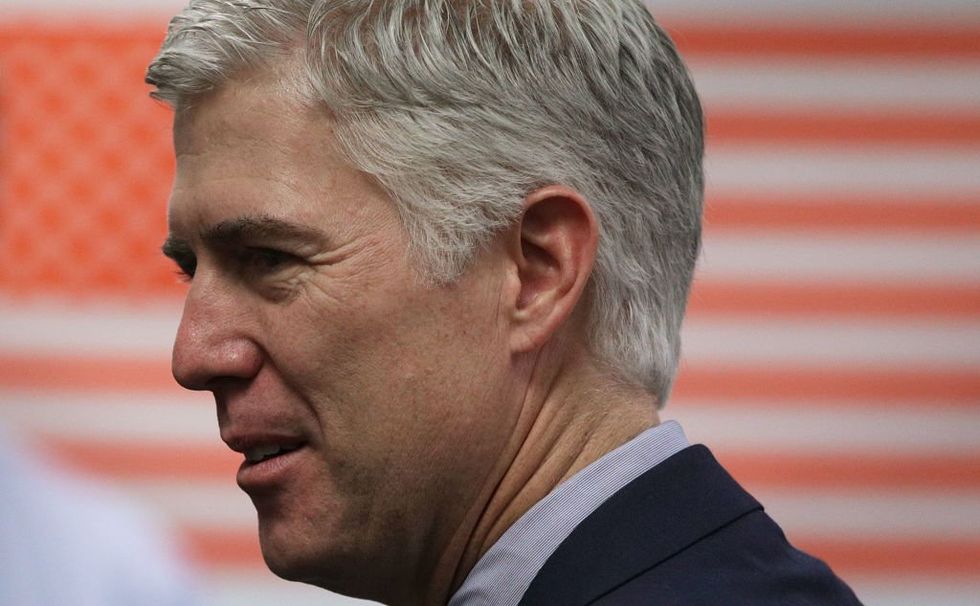
Liberals control the legal profession, from the law schools and litigious nonprofits to the bar associations and judges (including many Republican appointees). Judicial supremacy, implemented through âuniversal injunctions,â allows any liberal legal group to tap one of 670 district judges in 94 district courts to decide on a broad range of public policies, which the political elite then treat as âlaw.â
The good news: Evidence seems to suggest that at least three Supreme Court justices intend to end this irrational practice.
We might only have three justices on our side, but governors should still firmly reject overreaching judges who believe their position gives them veto power.
A law signed by a president or a governor doesnât need a judgeâs approval. Judges â Iâd include Supreme Court justices â donât have veto power. Rather, when a judge believes that a law violates constitutional rights (in a case that comes with proper standing before him), he has the power to grant relief to an individual plaintiff seeking permission for a particular action.
The belief that a federal judgeâs decision is the last word on an issue, automatically forcing other government branches to comply even if they believe the decision is unconstitutional, and that itâs universally binding, is incorrect. Itâs a misconception based on a mistaken belief in judicial supremacy and exclusivity.
Put simply, judges donât have the power to cancel or reject laws like a president or governor can with new legislation. The framers of the Constitution had considered a different approach called the âCouncil of Revisionâ that would have replaced, not added to, the presidentâs independent veto power.
So when liberal nonprofits (or conservatives, for that matter) challenge a state or federal law in district court, a judge can decide in favor of the group that brought the case. But that means the district judge can only render a ruling necessary for the plaintiff to obtain redress for the grievance before the court.
Which brings us to Labrador v. Poe, another in the growing body of cases in which district judges are universally enjoining duly passed statutes banning chemical and physical castration of minors. Last year, Idaho made it illegal for doctors to perform or prescribe treatments that âchangeâ a minorâs sex, and this law was approved overwhelmingly by both houses of the state’s legislature.
Later that year, two families seeking estrogen treatment and puberty blockers for their children sued in district court, and District Court Judge Lynn Winmill enjoined the entire law under the pretext that it likely violated the 14th Amendment because, evidently, Congress in 1867 sought to protect castration while extending due process to freed black slaves. The Ninth Circuit Court of Appeals naturally sided with the district judge, and Idaho officials filed an emergency appeal with the Supreme Court to stay the injunction.
Obviously, Winmillâs ruling is absurd. The 14th Amendment has nothing to say about the right to castrate minors. And, in any event, if someone thinks the judgeâs orders should be obeyed, his authority should extend only to the specific plaintiffs and their case, not to veto the entire law, especially not before a full trial has taken place. It’s unreasonable to think a judge can nullify a law in its entirety so quickly and easily, especially parts not involved in the case, like the ban on physical castration.
Thankfully, in this case, at least five justices announced their vote to overturn the injunction and pave the way for Idahoâs law to take effect. Justice Neil Gorsuch, however, wrote a vitally important concurring opinion that railed against the premise that judges have the power to issue universal injunctions against duly passed laws. He was joined by Clarence Thomas and Samuel Alito.
âIn recent years, certain district courts across the country have not contented themselves with issuing equitable orders that redress the injuries of the plaintiffs before them, but have sought instead to govern an entire State or even the whole Nation from their courtrooms,â Gorsuch laments. âToday, Idaho is on the receiving end of one of these universal injunctions, but lately it has often been the federal government.â
Gorsuch points out that universal and nationwide injunctions affecting people beyond a courtâs geographical jurisdiction and the original plaintiffs are relatively new in our history. He also acknowledges that the approach can swing both ways politically. We all remember how Trumpâs policies were blocked by Hawaiian judges (for some reason) who applied their injunctions nationwide. Gorsuch notes that during Obamaâs eight years, this happened only 19 times, but it happened 55 times in Trumpâs first three years.
The liberal justices lament the sheer volume of emergency injunctions pending before the court by various government actors related to high-profile public policy issues. Gorsuch rightly places the blame on lower court universal injunctions, however, noting the practice circumvents normal judicial processes and âtends to force judges into making rushed, high-stakes, low-information decisionsâ at all levels.
Gorsuch touches on one of the most vital policy changes we need. Unless universal injunctions are ended, red-state governments and the next Republican administration will be needlessly stymied by swift troll lawsuits and clownish liberal judges inventing specious constitutional arguments, knowing that even if they ultimately lose on the merits, they can undermine a law for years.
Clarence Thomas had previously railed against such injunctions in his 2018 concurrence in the Trump âtravel banâ case (Trump v. Hawaii). Thomas began by noting that absent statutory authority from Congress, lower courts have no power to issue universal injunctions. In fact, as Thomas observed in a footnote, even if Congress granted the courts such authority, they âwould need to consider whether that statute complies with the limits that Article III places on the authority of federal courts.â
âUniversal injunctions are legally and historically dubious,â Thomas concluded. âIf federal courts continue to issue them, this Court is dutybound to adjudicate their authority to do so.â
Undoubtedly, conservatives benefit from this practice once in a while against blue states and Democrat presidents. As Iâve long noted, however, the lower court injunctions far too often swing against us. The Idaho case notwithstanding, the Supreme Court is often reluctant to stay lower court injunctions. We might only have three justices on our side, but governors should still firmly reject overreaching judges who believe their position gives them veto power, too.
Also Read More: World News | Entertainment News | Celebrity News








